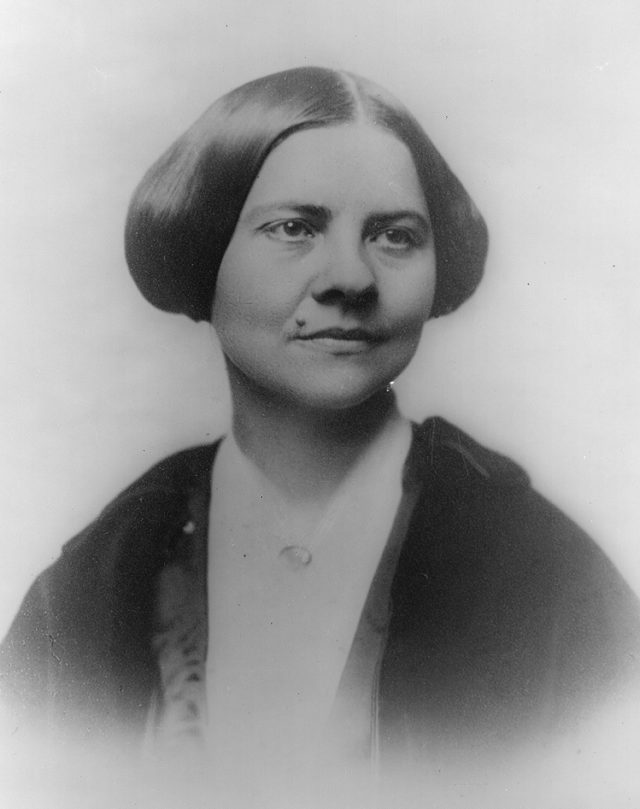“Got a telegram from Lucy Stone that her suffrage convention was to be here”
Lavinia exchanged dozens of letters with Lucy Stone, a pioneer for women’s rights and one of the most famous women in mid-19th century America. In 1870, Lucy and her husband launched the Woman’s Journal, which was hailed as a “history-maker and history recorder for the suffrage cause” by Carrie Chapman Catt, who played a leading role in the passage of the 19th Amendment. Catt said “the suffrage success of today is not conceivable without the Woman’s Journal‘s part in it.” Lavinia not only wrote for the Woman’s Journal, in December 1879 she was formally listed on its masthead as a contributor.

Lucy Stone was born in Brookfield, Massachusetts, on August 13, 1818. Her mother, who milked 8 cows the night before giving birth, reportedly said that she was sorry to have another daughter because a woman’s life is so hard.
According to family lore, even as a child Lucy was indignant at the way husbands treated their wives. She read a bible passage about women that said: “Thy desire shall be to thy husband, and he shall rule over thee.” She did not want to be ruled by men. She decided to attend college to learn Latin and Greek and find out if the Bible was translated accurately.
Lucy worked until she was 25 in order to scrape together enough money to attend the only university in the country that admitted both men and women: Oberlin College in Ohio.
Oberlin was so progressive that it also admitted Blacks and served as a stop on the Underground Railroad. Still, Lucy managed to shake things up. She earned tuition money by teaching at Oberlin’s Preparatory Department. Upon discovering that women were paid only half of what men received for the same job, she confronted the Faculty Board, demanded equal pay for women, and won.
Because women were not allowed to speak in public, Lucy and her friend, Antoinette Brown (the first woman ordained a protestant minister in America and Lucy’s future sister-in-law) formed the first women’s college debating society in the country. They held meetings secretly in the woods and, during cold weather, at the home of a Black woman on the outskirts of town.
In 1847, Oberlin invited its most accomplished seniors to read an essay at graduation. Lucy made the cut, but there was a catch. The faculty informed her that she could write an essay, but a male student would have to read it. Lucy declined the offer.
Within a year of graduation, the Anti-Slavery Society hired Lucy to travel and speak on abolitionism. She drew large audiences partly because of her eloquence and magnetism and partly because folks were curious to hear a woman lecture. Some crowds were tough. They spit upon her, threw books at her or doused her with water. She persisted.
By 1850, Lucy was arranging her own speaking tours focused on women’s rights. She even traveled to Wisconsin and lectured on suffrage in Racine, Milwaukee, Janesville, and Madison and persuaded two legislative assemblymen to present her petition on women’s suffrage to the Wisconsin legislature. Three men actually voted for it. To learn more, click here.
Lucy had vowed that she would never marry, so when she wed Henry Blackwell (brother of Drs. Elizabeth and Emily Blackwell), she made national headlines. Lucy kept her maiden name. Plus, the couple removed the word “obey” from their vows and read a “marriage protest” declaring that they would not follow laws that refused to recognize a wife as an independent, rational being.
In 1869, America’s suffragists split over whether to support the 15th Amendment, which granted African-American men the right to vote. Susan B. Anthony and Elizabeth Cady Stanton formed the National Woman Suffrage Association, which opposed the Amendment because it did not include women. Lucy Stone, William Lloyd Garrison, Mary Livermore and others formed the American Women’s Suffrage Association, which supported the Amendment while pledging to continue working for women’s suffrage.
The following year, Lucy and Henry launched the Woman’s Journal. It quickly became the most successful women’s newspaper in the country.
A year into its run, the Woman’s Journal featured a series of articles in which Lavinia dismantled the prevailing objections to woman’s suffrage. Read more here. That was only the beginning. Lavinia wrote dozens of articles on women’s issues for the paper up until a few months before her death.
The last known communication between Lucy and Lavinia occurred in September 1879. Lucy telegrammed to say that the 1879 Women’s Congress would be held the next month in Madison, Wisconsin. Lavinia, who was then quite ill and just 6 months from death, gave speeches encouraging women to become lawyers and promoting prison reform, and said that she enjoyed the congress immensely. Read more here.
Sources consulted: Lavinia Goodell’s Diaries, 1873-1877, 1879; Sally G. McMillen, Lucy Stone, An Unapologetic Life, New York: Oxford University Press, 2015; Frances E. Willard and Mary A. Livermore, A Woman of the Century, Buffalo: Charles Well Moulton, 1893; Alice Stone Blackwell, Lucy S. Stone: Pioneer of Woman’s Rights, Charlottesville: University of Virginia Press, 1930; Janice P. Nimura, The Doctors Blackwell: How Two Pioneering Sisters Brought Women to Medicine and Medicine to Women, New York: W.W. Norton & Company 2021; https://www2.oberlin.edu/external/EOG/OYTT-images/LucyStone.html.







